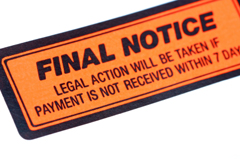April 15 was the tax day deadline for most people. If you are due a refund there is no penalty if you file a late tax return. But if you owe tax, and you failed to file and pay on time, you will owe interest and penalties on the tax you pay late. You should file your tax return and pay the tax as soon as possible to stop them. Here are eight facts that you should know about these penalties.
- Two penalties may apply. If you file your federal income tax return late and owe tax with the return, two penalties may apply. The first is a failure-to-file penalty for late filing. The second is a failure-to-pay penalty for paying late.
- Penalty for late filing. The failure-to-file penalty is normally 5 percent of the unpaid taxes for each month or part of a month that a tax return is late. It will not exceed 25 percent of your unpaid taxes. However if you requested a six month extension by filing form 4868 by April 15, and filed the return by October 15, you will not be penalized for late filing.
- Minimum late filing penalty. If you file your return more than 60 days after the due date or extended due date, the minimum penalty for late filing is the smaller of $135 or 100 percent of the unpaid tax.
- Penalty for late payment. The failure-to-pay penalty is generally 0.5 percent per month of your unpaid taxes. It applies for each month or part of a month your taxes remain unpaid and starts accruing the day after taxes are due. It can build up to as much as 25 percent of your unpaid taxes.
- Combined penalty per month. If the failure-to-file penalty and the failure-to-pay penalty both apply in any month, the maximum amount charged for those two penalties that month is 5 percent.
- File even if you can’t pay. In most cases, the failure-to-file penalty is 10 times more than the failure-to-pay penalty. So if you can’t pay in full, you should file your tax return and pay as much as you can. Use IRS Direct Pay to pay your tax directly from your checking or savings account. Most people can set up an installment agreement with the IRS using the Online Payment Agreement tool on IRS.gov or calling 1-800-829-1040 or filing form 9465.
- Late payment penalty may not apply if you filed an extension. If you requested a six month extension of time to file your federal income tax return by April 15 and paid at least 90 percent of the taxes you owe, you will not face a failure-to-pay penalty. However, you must pay the remaining balance by the October 15. You will owe interest on any taxes you pay after the April 15 due date.
- No penalty if reasonable cause. You will not have to pay a failure-to-file or failure-to-pay penalty if you can show reasonable cause for not filing or paying on time. There is also penalty relief available for repayment of excess advance payments of the premium tax credit for 2014. If you have any questions please contact Spadea & Associates, LLC online or at 610-521-0604.








